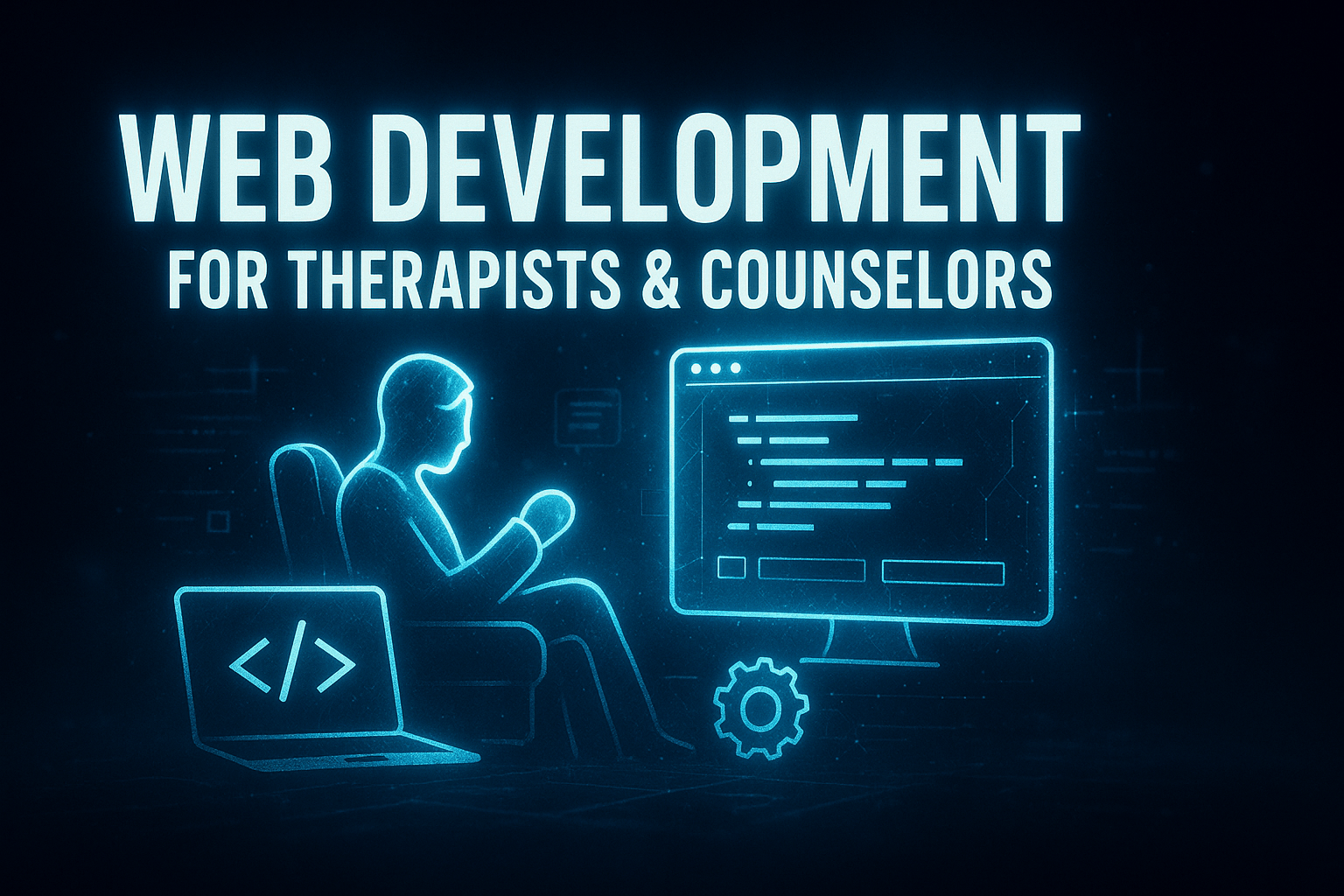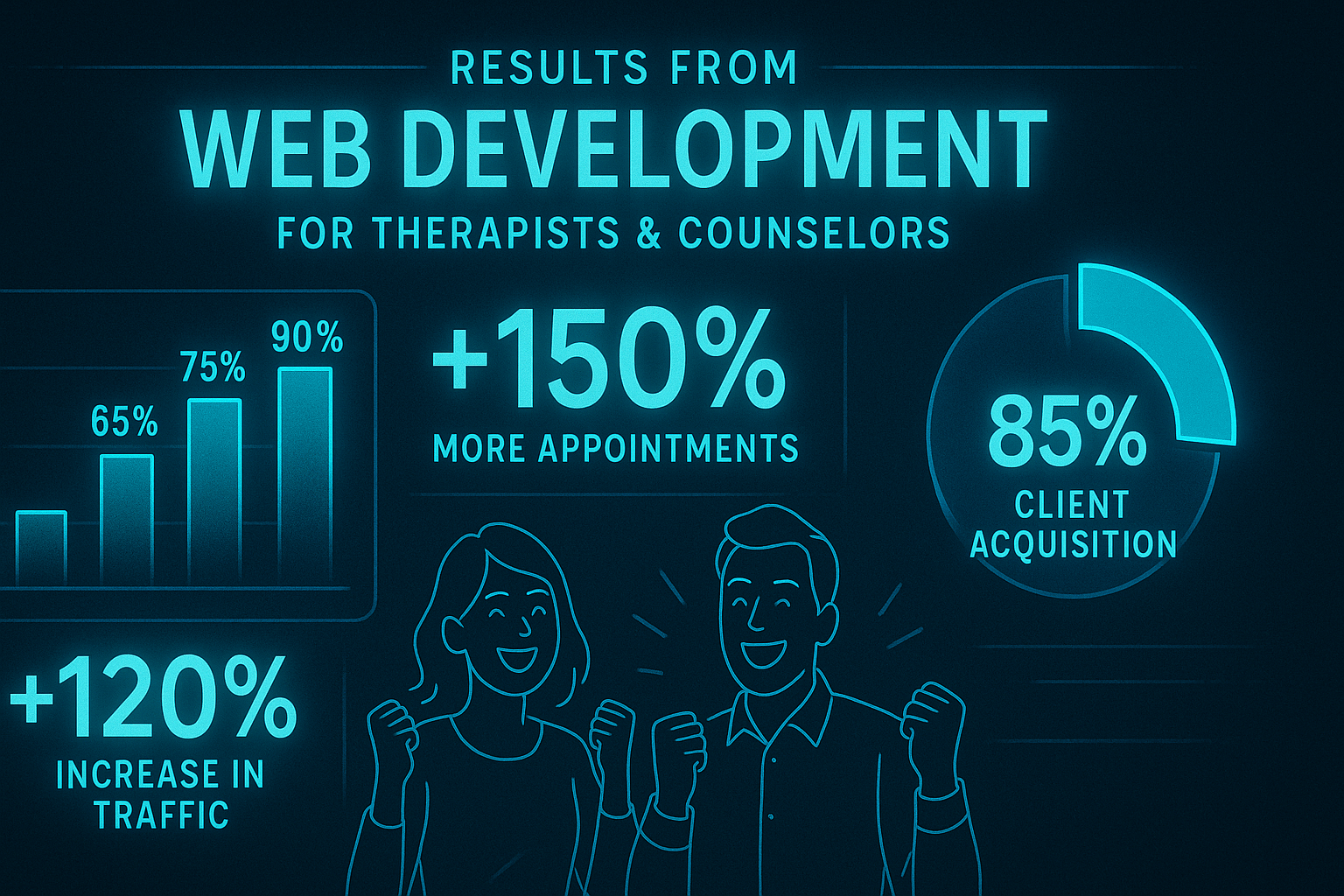Professional Web Development for Therapists & Counselors: Build Trust, Book More Clients, and Scale Your Practice
by Design Delulu Editorial · October 10, 2025

Smart, fast, and measurable. Here's how Web Development helps Therapists & Counselors win.
Your website is often the first place potential clients encounter your practice—and in the mental health field, that first impression carries extraordinary weight. People seeking therapy or counseling are making themselves vulnerable, searching for someone they can trust with their deepest challenges. If your website feels outdated, confusing, or impersonal, they'll move on to the next practitioner before you ever get a chance to help them.
For therapists and counselors, web development isn't just about aesthetics or technical performance—it's about creating a digital space that reflects the empathy, professionalism, and expertise you bring to your practice. The right website builds immediate trust, clearly communicates your specialties, makes booking seamless, and ensures compliance with healthcare privacy regulations. When these elements come together, your website becomes your most powerful marketing asset, working around the clock to attract ideal clients and grow your practice sustainably.

Why Therapists and Counselors Need Specialized Web Development
Mental health professionals face unique challenges that generic website templates simply can't address. Your website must balance warmth with professionalism, provide detailed information while maintaining simplicity, and above all, protect client privacy while enabling easy communication.
The trust barrier is higher in mental health. Unlike shopping for products or even many other services, choosing a therapist requires exceptional vulnerability. Potential clients are evaluating not just your credentials, but whether they feel safe opening up to you. Your website must communicate empathy through design choices, copy tone, and user experience—all while maintaining the professional credibility that reassures clients they're in capable hands.
Compliance isn't optional—it's foundational. HIPAA regulations govern how you handle client information, even on your website. Contact forms, appointment scheduling systems, and any data collection must be properly secured. Many website builders and off-the-shelf solutions don't account for these requirements, potentially exposing your practice to legal liability and, more importantly, compromising client trust.
Your ideal clients are searching right now. Whether someone is experiencing a crisis, seeking support for ongoing challenges, or looking for specialized therapy approaches, they're likely starting their search online. If your website doesn't rank for relevant search terms, loads slowly on mobile devices, or fails to clearly communicate your specialties, you're invisible to the people who need you most.
Key challenges specialized web development solves:
- Converting website visitors into booked consultations through strategic placement of calls-to-action and simplified contact processes
- Clearly differentiating your approach and specialties in a crowded market
- Building credibility through professional design, client testimonials, and credential displays
- Ensuring mobile responsiveness for clients searching during moments of need
- Integrating HIPAA-compliant forms, scheduling, and communication tools
- Creating accessible experiences for clients with diverse needs and abilities
- Establishing strong local SEO to capture nearby clients searching for therapy services
Core Components of Effective Therapy Websites
Building a website that actually grows your practice requires strategic attention to specific elements that mental health clients prioritize when evaluating potential therapists.
Homepage: Your Digital Front Door
Your homepage serves as the entry point for most visitors and must accomplish multiple goals simultaneously: establish trust, communicate your unique value, and guide visitors toward booking a consultation.
Essential homepage elements:
- Clear positioning statement: Within seconds, visitors should understand who you help and what problems you solve (e.g., "Anxiety counseling for high-achieving professionals in Chicago")
- Welcoming hero section: Professional headshot or warm, inviting imagery that humanizes your practice
- Immediate credibility signals: Licenses, certifications, years of experience, and professional affiliations
- Specialty areas: Clearly listed therapeutic approaches and conditions you treat
- Primary call-to-action: Prominent "Schedule a Free Consultation" or "Get Started" button above the fold
- Social proof: Testimonials or client success indicators (while maintaining confidentiality)
- Accessibility statement: Information about office accessibility and accommodation options
About Page: Building the Therapeutic Alliance Online
Potential clients aren't just evaluating your qualifications—they're assessing whether they can develop a therapeutic relationship with you. Your About page should feel like the first session, where someone begins to sense whether you're the right fit.
Effective About page strategies:
- Lead with your therapeutic philosophy and approach to building client relationships
- Share your personal journey into the field (appropriate self-disclosure builds connection)
- Highlight specialized training relevant to your target client population
- Use authentic, professional photos that show your personality
- Address common concerns your ideal clients face
- Include your full credentials, licenses, and continuing education
- Explain your cultural competencies and language capabilities if relevant
Services Pages: Matching Clients to Solutions
Detailed services pages help potential clients self-identify whether you can help them while establishing your expertise in specific therapeutic modalities or populations.
Structure for services pages:
- Individual service pages for each specialty (anxiety treatment, couples therapy, trauma counseling, etc.)
- Clear descriptions of what each service involves and who it's designed for
- Expected outcomes or what clients can hope to achieve
- Session format (in-person, telehealth, or hybrid), duration, and frequency
- Insurance and payment information or links to detailed fee structures
- Gentle calls-to-action that acknowledge the difficulty of taking the first step

Contact and Booking Systems
The booking process is where trust converts into appointments—or where potential clients drop off. Making this experience as frictionless and secure as possible directly impacts your practice growth.
HIPAA-compliant contact solutions:
- Secure contact forms with SSL encryption and proper data handling
- Integrated scheduling systems (SimplePractice, TherapyNotes, or secure alternatives)
- Clear privacy notices at every data collection point
- Multiple contact options (phone, form, secure email) to accommodate preferences
- Automated confirmation emails that feel personal, not robotic
- Clear information about response times to manage expectations
Reducing booking friction: Every additional step in your booking process represents a potential point where someone might abandon the process. The ideal system allows someone to schedule a consultation in 2-3 minutes without creating unnecessary barriers while still maintaining proper security protocols.
Technical Foundation: Performance, Security, and Accessibility
Behind every effective therapy website lies a robust technical infrastructure that ensures fast loading, data protection, and universal accessibility—elements that directly influence both user experience and search engine rankings.
Performance Optimization
Why speed matters in mental health: Someone experiencing anxiety or crisis may already be in a heightened state. A slow-loading website can amplify frustration and cause them to abandon their search for help. Research shows that 53% of mobile users abandon sites that take longer than three seconds to load.
Key performance strategies:
- Image optimization and compression without quality loss
- Efficient code structure and minimal plugin/script usage
- Content delivery networks (CDN) for faster global access
- Lazy loading for below-the-fold content
- Mobile-first design approach for smartphone users
- Regular performance audits and speed testing
HIPAA Compliance and Data Security
Even though your website typically handles prospective clients (not existing patient records), the moment someone submits a contact form with any health-related information, HIPAA considerations come into play.
Essential security measures:
- SSL certificates: Encrypts all data transmitted between visitor browsers and your server
- Secure hosting: HIPAA-compliant hosting providers with proper business associate agreements
- Form encryption: Additional encryption layers for contact and intake forms
- Privacy policy: Comprehensive, legally compliant privacy documentation
- Regular security updates: Keeping all platforms, plugins, and systems current
- Data minimization: Only collecting information absolutely necessary for initial contact
- Access controls: Limiting who can access website backend and client data
Accessibility for Diverse Client Needs
Mental health services should be accessible to everyone, and that inclusivity must extend to your digital presence. Web accessibility isn't just ethical—it's also legally required under the Americans with Disabilities Act for many practices.
Accessibility best practices:
- Sufficient color contrast for visitors with visual impairments
- Alt text for all images and graphics
- Keyboard navigation capability for users who can't use a mouse
- Screen reader compatibility
- Clear heading hierarchy for easy navigation
- Captioning for any video content
- Readable font sizes and simple language options
- Forms with clear labels and error messages
SEO Strategy: Connecting with Clients Who Need You
The most beautifully designed therapy website serves no purpose if potential clients can't find it. Strategic search engine optimization ensures your practice appears when people in your area search for the specific help you provide.
Local SEO for Therapists
Most therapy clients search for providers within a specific geographic area. Dominating local search results dramatically increases your visibility to ideal clients at the exact moment they're seeking help.
Local SEO tactics:
- Google Business Profile optimization: Complete profile with accurate hours, services, photos, and regular posts
- Location-specific pages: Dedicated pages for each city or neighborhood you serve
- Local keywords: "Therapist in [City]," "[Specialty] counseling near [Neighborhood]"
- Directory listings: Consistent NAP (Name, Address, Phone) across Psychology Today, TherapyDen, GoodTherapy, and other directories
- Local backlinks: Connections with local hospitals, wellness centers, and community organizations
- Review generation: Ethical systems for encouraging satisfied clients to share their experiences
Content Strategy for Specialty Areas
Creating valuable content around your specialties establishes expertise, ranks for long-tail keywords, and builds trust with potential clients researching their options.
High-value content types:
- Condition-specific guides: "Understanding and Managing Social Anxiety Disorder"
- Treatment approach explanations: "What to Expect from EMDR Therapy"
- Blog posts answering common questions: "How Do I Know If I Need Therapy?"
- Video content: Brief, informative videos introducing yourself and your approach
- Resource pages: Curated lists of helpful tools, exercises, or external resources
Keyword research for therapists: Focus on long-tail, intent-driven keywords that reveal what potential clients are struggling with: "therapist for postpartum depression," "couples counseling to save marriage," "trauma therapy for veterans," rather than generic terms like "therapy" or "counselor."
Technical SEO Essentials
Beyond content and local optimization, technical factors significantly influence how search engines crawl, understand, and rank your website.
Technical SEO checklist:
- Mobile-responsive design (Google prioritizes mobile-first indexing)
- Fast page load speeds (performance is a ranking factor)
- XML sitemap submission to search engines
- Structured data markup (LocalBusiness schema for therapists)
- Clean URL structures that include relevant keywords
- Internal linking between related service and content pages
- Regular content updates to signal site activity
- Broken link identification and repair

Conversion Optimization: From Visitors to Clients
Traffic without conversions is meaningless. Every element of your website should guide visitors toward taking that critical first step: reaching out to schedule a consultation.
Strategic Call-to-Action Placement
Multiple, varied CTAs throughout the site:
- Primary CTA: "Schedule Free Consultation" in header/navigation, visible on every page
- Contextual CTAs: Relevant next steps at the end of each service page or blog post
- Softened CTAs: "Learn More About My Approach" for visitors not ready to commit
- Crisis resources: Immediate help links for visitors in acute distress
- Newsletter signup: Stay connected option for those researching options
Trust Signals and Social Proof
In mental health, credibility directly correlates with conversion rates. Strategic placement of trust signals throughout your site removes hesitation.
Effective trust elements:
- Professional credentials: License numbers, certifications, and professional memberships
- Client testimonials: Specific, detailed reviews (with proper consent and anonymization)
- Years of experience: Quantified expertise in your specialty areas
- Media mentions or publications: External validation of your expertise
- Professional headshots: High-quality, approachable photography
- Insurance accepted: Clear information reducing financial uncertainty
- Secure symbols: HIPAA compliance badges and security certificates
A/B Testing and Analytics
The most effective therapy websites continuously evolve based on real user behavior data, not assumptions about what might work.
Elements worth testing:
- Headline variations on your homepage
- Different CTA button text ("Book Now" vs. "Schedule Free Consultation" vs. "Get Started")
- Contact form length (fewer fields typically increases submissions)
- Placement of testimonials and trust signals
- Above-the-fold content and imagery
Key metrics to track:
- Conversion rate: Percentage of visitors who complete contact forms or schedule appointments
- Bounce rate: How many leave immediately (high bounce rates signal relevance or UX issues)
- Time on page: Engagement depth with your content
- Form abandonment rate: Where potential clients drop off in the booking process
- Traffic sources: Which channels drive the most qualified leads
- Page performance: Which service pages convert best
Integration with Practice Management Systems
Your website shouldn't exist in isolation—it should integrate seamlessly with the tools you use to run your practice, creating an efficient workflow from first contact through ongoing care.
Popular Integrations for Therapists
- SimplePractice: All-in-one practice management with client portal, scheduling, billing, and telehealth
- TherapyNotes: Comprehensive EHR with integrated calendar and appointment reminders
- Headway: Insurance credentialing and billing support with client scheduling
- Psychology Today: Profile integration to drive referrals from the largest therapist directory
- Google Workspace: HIPAA-compliant email and calendar systems
- Calendly or Acuity: Standalone scheduling tools with availability management
Automated Workflows That Save Time
Strategic automation reduces administrative burden while improving client experience:
- Appointment confirmations: Automatic reminders sent 48 hours and 24 hours before sessions
- Intake form delivery: New clients receive paperwork immediately after scheduling
- Email sequences: Welcome series for newsletter subscribers or consultation schedulers
- Follow-up systems: Automated check-ins after initial consultations
Ongoing Maintenance and Evolution
Launching your website is just the beginning. The most successful therapy websites undergo continuous refinement based on changing best practices, client feedback, and business growth.
Regular Maintenance Tasks
- Security updates: Monthly platform and plugin updates to patch vulnerabilities
- Content refreshes: Quarterly review of service descriptions, fees, and practice information
- Performance monitoring: Monthly speed tests and optimization adjustments
- Backup verification: Weekly automated backups with periodic restoration testing
- SEO monitoring: Monthly keyword ranking checks and competitor analysis
- Analytics review: Quarterly deep dives into traffic patterns and conversion metrics
When to Consider a Redesign
Most therapy websites benefit from significant updates every 3-4 years, but certain triggers indicate it's time for a refresh:
- Your practice focus or specialties have significantly evolved
- Conversion rates have plateaued or declined
- The design feels dated compared to competitor sites
- Mobile experience is suboptimal (especially critical post-2023)
- You're expanding to multiple locations or practitioners
- New compliance requirements demand infrastructure changes
Choosing the Right Web Development Partner
Working with developers who understand the unique needs of mental health practices ensures your website becomes a genuine asset rather than a source of frustration.
Questions to Ask Potential Developers
- Do you have experience building HIPAA-compliant websites for healthcare providers?
- Can you show examples of therapy or counseling websites you've created?
- How do you handle ongoing security updates and maintenance?
- What's your process for SEO and conversion optimization?
- How do you ensure accessibility compliance?
- What analytics and reporting will I receive?
- Can you integrate with my existing practice management software?
- What's the typical timeline from kickoff to launch?
- What happens if I need changes or support after launch?
Red Flags to Avoid
- Unwillingness to discuss HIPAA compliance or security measures
- Portfolio showing only generic template designs
- No clear process for understanding your unique practice and goals
- Promises of "number one rankings" or unrealistic timeline guarantees
- Lack of transparency about ongoing costs
- No references from previous healthcare clients
Frequently Asked Questions
Let’s level up your Therapists & Counselors business
Need services that actually move the needle for Therapists & Counselors? See our approach, pricing, and timelines—then book a quick call.
Additional Resources
- Schedule Your Strategy Call
Book a free 30-minute consultation to discuss your practice goals, technical requirements, timeline, and how we can create a website that genuinely grows your therapy practice.
- View Our Therapy Website Portfolio
Explore real examples of therapy and counseling websites we've built—featuring HIPAA-compliant designs, conversion-optimized layouts, and specialized integrations for mental health practices.
- Free Tools for Therapists
Access our collection of free resources including website audit checklists, SEO keyword tools for mental health practices, and conversion optimization templates designed specifically for therapists.
Related Reading

Transform your K-12 or tutoring website into a lead-generating machine. Discover 7 proven web development strategies that drive enrollments and boost parent engagement.

Transform your café or bakery with strategic web development. Online ordering, mobile optimization, and customer engagement tools that drive revenue. Expert guide + pricing.
